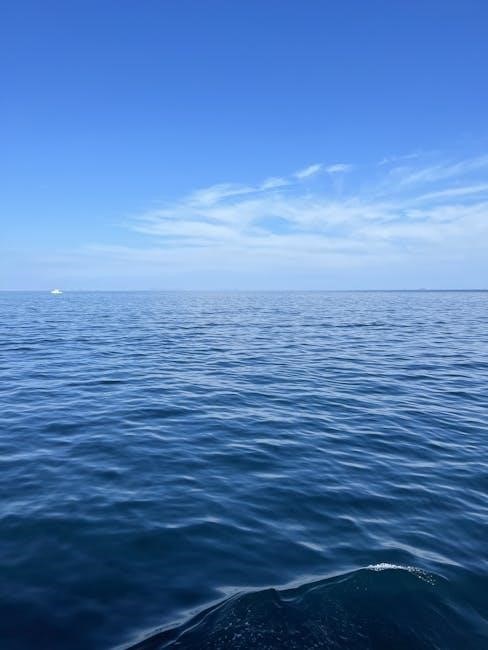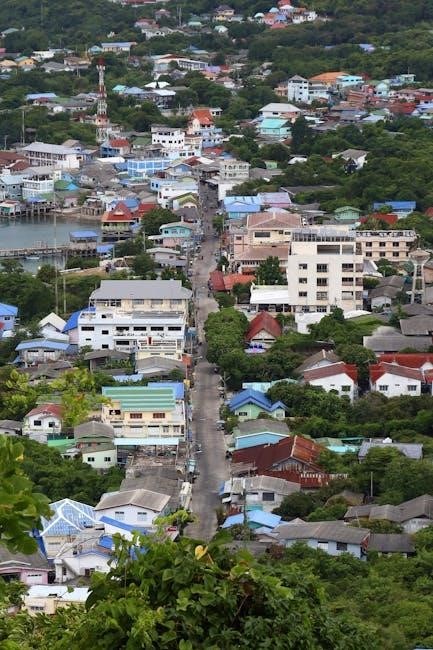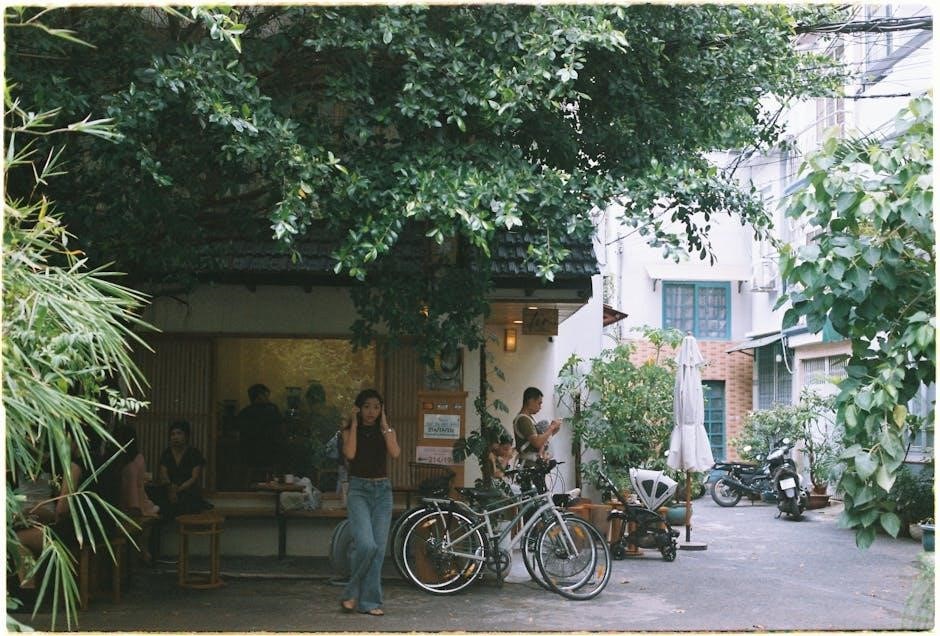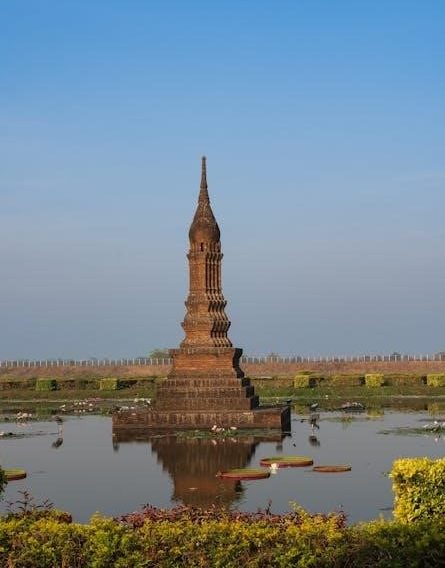Thailand’s sex industry is a paradox: illegal yet widely tolerated, it thrives as a global sex tourism hub, shaped by history, culture, and economic necessity.
1.1 Brief Overview of Thailand’s Sex Guide
Thailand’s sex industry operates as an open secret, with red-light districts and entertainment zones openly catering to both locals and tourists. Despite being illegal under Thai law, the industry thrives due to widespread tolerance and corruption. Major cities like Bangkok, Pattaya, and Phuket are known for their vibrant nightlife, featuring bars, massage parlors, and go-go clubs. These areas attract millions annually, contributing significantly to Thailand’s economy. The sex guide highlights the contrast between legal frameworks and societal acceptance, offering insights into the cultural and economic factors driving this multibillion-dollar industry.
1.2 Purpose of the Guide
The purpose of this guide is to provide an in-depth exploration of Thailand’s sex industry, addressing its legal status, cultural attitudes, economic drivers, and societal implications. It aims to shed light on the complexities of the industry, offering insights into its history and current trends. By examining the interplay between legality, tolerance, and demand, the guide seeks to inform readers about the challenges and debates surrounding sex work in Thailand. It also highlights recent developments, such as proposed legalization and ongoing advocacy for workers’ rights, aiming to foster a nuanced understanding of this controversial yet significant aspect of Thai society and economy. The guide serves as a comprehensive resource for those interested in understanding the multifaceted nature of Thailand’s sex industry.

Legal Status of Sex Work in Thailand
Prostitution is illegal under Thailand’s 1996 Prevention and Suppression of Prostitution Act, yet the industry thrives due to widespread acceptance and corruption, creating a legal gray area.
2.1 Current Laws and Regulations
Under Thailand’s 1996 Prevention and Suppression of Prostitution Act, selling sex is illegal, but buying it is not explicitly criminalized, creating a legal loophole. Brothels and pimping are prohibited, with penalties including fines and imprisonment. Despite this, the sex industry operates openly, particularly in designated red-light districts. Authorities often tolerate the practice, turning a blind eye unless minors or trafficking are involved. Recent drafts propose decriminalizing voluntary sex work to improve safety and rights for workers, reflecting evolving attitudes toward the industry. These laws apply to both nationals and foreigners, with no separate provisions for tourists. Enforcement remains inconsistent, leaving sex workers vulnerable without legal protections.
2.2 Enforcement of Prostitution Laws
Despite being illegal under Thai law, prostitution laws are inconsistently enforced, with authorities often turning a blind eye to the industry’s operations. Police corruption plays a significant role, as officials may accept bribes to overlook brothels and street-based sex work. Crackdowns are rare and typically occur in response to high-profile cases involving trafficking or underage individuals. Enforcement is further complicated by the industry’s ubiquity in tourist areas, where it is openly tolerated. Recent proposals aim to decriminalize sex work to enhance safety and reduce exploitation, but current laws remain in place, leaving workers without legal protections. Public perception and tourism pressures also influence the lax enforcement of prostitution laws.
2.3 Legal Age of Consent
In Thailand, the legal age of consent for sexual activities is 15 years old, as outlined in the Thai Penal Code, Section 279. Engaging in sexual acts with individuals under this age is illegal and considered a serious offense. However, the enforcement of this law within the context of the sex industry remains inconsistent. While the law aims to protect minors, the underground nature of the industry often leads to violations, with some underage individuals being forced or coerced into sex work. Authorities occasionally crackdown on establishments suspected of involving minors, but such cases are challenging to monitor due to the industry’s secretive operations. The legal age of consent is a critical factor in ongoing debates about regulation and protection within Thailand’s sex industry.

Historical Background of the Sex Industry
Thailand’s sex industry traces its origins to the Vietnam War era, when American soldiers boosted demand for entertainment. Post-war, the industry expanded, driven by tourism and economic opportunities.
3.1 Origins During the Vietnam War Era
The Vietnam War marked the beginning of Thailand’s sex industry boom. American soldiers on R&R flocked to Thailand, creating a surge in demand for entertainment and sex services. Cities like Bangkok and Pattaya became hubs for bars, brothels, and nightlife catering to military personnel. This period laid the foundation for Thailand’s reputation as a sex tourism destination. The influx of foreigners brought economic opportunities, encouraging the growth of red-light districts and entertainment venues. Local authorities, recognizing the economic benefits, adopted a tolerant stance, allowing the industry to flourish despite its illegal status. This era set the stage for the industry’s expansion in the post-war period.
3.2 Post-War Expansion of the Industry
Following the Vietnam War, Thailand’s sex industry expanded rapidly, transitioning from a wartime necessity to a thriving tourist attraction. The government, recognizing the economic potential, adopted a tolerant approach, allowing red-light districts to operate openly. Cities like Pattaya and Phuket became synonymous with sex tourism, attracting millions of visitors annually. The industry’s growth was fueled by Thailand’s strategic location, tropical climate, and affordable prices, making it a magnet for international travelers. Economic necessity also played a role, as many women from rural areas turned to sex work due to limited employment opportunities. This period solidified Thailand’s global reputation as a sex tourism hub, blending cultural openness with commercialized sexuality.

Economic Factors Driving the Industry
Poverty, limited job opportunities, and tourism demand fuel Thailand’s sex industry, generating billions annually while offering livelihoods for many, despite its illegal status and societal stigma.
4.1 Poverty and Lack of Economic Opportunities
Poverty and limited economic opportunities are key drivers of Thailand’s sex industry. Many individuals, particularly women from rural areas like Isaan, turn to sex work due to a lack of alternative livelihoods. With limited access to education and well-paying jobs, they often migrate to urban centers such as Bangkok and Pattaya, where the demand for sexual services is high. This economic necessity is compounded by the stigma attached to sex work, making it difficult for workers to transition to other industries; Despite the risks, the financial rewards often outweigh the challenges, providing essential income for themselves and their families. This cycle perpetuates the industry’s growth and resilience.
4.2 Contribution to Thailand’s Economy
Thailand’s sex industry significantly contributes to the nation’s economy, particularly through tourism. The industry attracts millions of visitors annually, generating substantial revenue for hotels, restaurants, and entertainment venues. While the exact economic impact is difficult to quantify due to its illegal status, estimates suggest it adds billions of baht each year. The industry also supports ancillary businesses, such as transportation and retail, creating indirect employment opportunities. Additionally, it provides livelihoods for hundreds of thousands of workers, many of whom rely on it as their primary income source. Despite its illicit nature, the sex industry plays a crucial role in sustaining economic activity, especially in tourist-heavy regions like Bangkok and Pattaya.

Cultural Attitudes Toward Sex Work
Thailand’s culture balances conservative traditions with an unusually open-minded approach to sexuality, fostering a societal acceptance of sex work despite its legal prohibition and religious influences.
5.1 Societal Acceptance and Tolerance
Thai society exhibits a unique blend of tolerance and stigma toward sex work. Despite its illegality, the industry is openly visible, particularly in tourist areas like Bangkok and Pattaya. Many Thais view sex work as a practical solution to economic hardship, especially for women from rural regions. This acceptance is partly due to a cultural pragmatism that prioritizes survival over moral judgment. However, while the practice is widely acknowledged, sex workers often face social stigma and lack legal protections. This duality reflects a society that tolerates the industry’s existence but does not fully embrace it as a legitimate profession.
5.2 Influence of Religion on Sexuality
Religion, particularly Buddhism, plays a significant role in shaping Thai attitudes toward sexuality. While Buddhist teachings emphasize moderation and moral behavior, Thai culture exhibits a relatively open-minded approach to sex. This dichotomy allows the sex industry to coexist with religious values, as many Thais view sex work as a pragmatic choice rather than a moral failing. However, religious influence also contributes to the stigma surrounding sex work, as it is often seen as incompatible with Buddhist principles of modesty and restraint. Despite this, the cultural acceptance of sexuality in Thailand creates a unique balance between religious norms and practical realities, allowing the sex industry to thrive despite its controversial nature.

Red-Light Districts in Thailand
Thailand’s red-light districts, though illegal, flourish in Bangkok, Pattaya, and Phuket, featuring bars, clubs, and massage parlors that cater to diverse preferences, drawing tourists and locals alike.
6.1 Bangkok’s Notorious Areas
Bangkok’s red-light districts, such as Patpong, Nana Plaza, and Soi Cowboy, are renowned for their vibrant nightlife and adult entertainment. These areas attract a mix of tourists and locals, offering a variety of bars, go-go clubs, and massage parlors. Despite the illegality of prostitution, these districts operate openly, often with tacit police acceptance. Patpong, one of the oldest red-light areas, is famous for its night market and entertainment venues, while Nana Plaza is known for its concentrated cluster of go-go bars. Soi Cowboy, named after a cowboy-hat-wearing American who opened a bar in the 1970s, is another hotspot. These areas contribute significantly to Bangkok’s reputation as a global sex tourism destination.
6.2 Pattaya and Other Tourist Cities
Pattaya, a coastal city, is one of Thailand’s most notorious sex tourism hubs, particularly known for its vibrant nightlife and red-light districts like Walking Street; This area is packed with go-go bars, nightclubs, and massage parlors, catering to both domestic and international visitors. Other tourist cities, such as Phuket and Chiang Mai, also host thriving sex industries. Phuket’s Patong Beach and Chiang Mai’s Night Bazaar are hotspots for adult entertainment. Koh Samui, while more upscale, also has discreet sex work operations. These cities attract millions annually, blending tourism with the sex industry, which remains a significant economic driver despite its illegal status.

Safety and Health Considerations
Thailand’s sex industry poses safety risks due to its illegal status, but precautions like condom use and regular health checkups help mitigate risks and prevent STDs.
7.1 Risks and Precautions for Participants
Engaging in Thailand’s sex industry carries significant risks, including exposure to sexually transmitted diseases, exploitation, and legal consequences. Despite the illegal status of sex work, participants often face limited protection under the law. To mitigate these risks, it is crucial for both sex workers and clients to take precautions, such as using condoms consistently and undergoing regular health check-ups. Additionally, being aware of local laws and avoiding involvement with underage individuals or trafficked persons is essential to minimize legal and ethical dilemmas. While authorities may overlook the industry, severe penalties can apply in cases involving exploitation or abuse.
7.2 Health Measures and STD Prevention
Health risks, particularly sexually transmitted diseases (STDs), are significant concerns in Thailand’s sex industry. Consistent condom use is crucial to reduce the risk of infections like HIV, chlamydia, and gonorrhea. Many sex workers and clients, however, may not consistently practice safe sex due to various factors, including lack of education or negotiation power. Regular health screenings and access to medical care are vital, yet many sex workers face barriers to these services due to stigma or legal status. NGOs and health organizations play a key role in providing STD prevention resources and promoting safer practices. Despite these efforts, the prevalence of STDs remains a challenge, underscoring the need for continued education and access to healthcare.

Impact of Tourism on the Industry
Tourism significantly fuels Thailand’s sex industry, with millions of visitors seeking adult entertainment; Cities like Bangkok and Pattaya cater to this demand, despite prostitution’s illegal status.
8.1 Role of Tourists in Driving Demand
Tourists play a pivotal role in sustaining Thailand’s sex industry, with millions visiting annually, drawn by the country’s reputation for affordable and accessible adult entertainment. Many travelers, particularly from Western countries, view Thailand as a destination where they can engage in sex work without significant legal or social repercussions. This high demand fuels the growth of red-light districts in cities like Bangkok, Pattaya, and Phuket, creating a lucrative market that attracts both local and migrant workers. The tourism-driven economy not only supports the industry but also perpetuates its visibility and acceptance, despite its illegal status under Thai law.
8.2 Thailand’s Global Reputation
Thailand’s global reputation as a sex tourism hub is deeply ingrained, shaped by decades of notoriety. Its vibrant red-light districts, go-go bars, and massage parlors attract millions of tourists annually, seeking affordable and accessible adult entertainment. This image, though controversial, has become synonymous with Thailand’s international identity. Despite prostitution being illegal, the industry’s visibility and tolerance by authorities perpetuate its global fame. Thailand’s reputation as a destination for sex tourism is further fueled by its historical ties to the Vietnam War era, when it became a hotspot for American soldiers. Today, the country’s sex industry remains a significant draw, contributing to its economy and reinforcing its reputation as a place where such activities are not only available but also culturally tolerated, despite legal and moral ambiguities.
Sex Work and Its Societal Implications
Thailand’s sex industry sparks debates on stigma, labor rights, and cultural acceptance, with ongoing efforts to legalize and protect sex workers amid societal and moral challenges.
9.1 Stigma and Public Perception
Societal stigma surrounding sex work in Thailand persists, with many viewing it as immoral despite its prevalence. Public perception is complex, balancing tolerance with moral judgment. While some accept it as a necessary economic choice, others condemn it due to religious and cultural norms. Sex workers often face discrimination and marginalization, limiting their access to rights and protections. Advocacy groups are pushing to reduce stigma and promote understanding, arguing that decriminalization could improve workers’ lives and societal acceptance. The debate reflects broader tensions between tradition and modernity in Thailand’s evolving culture.
9.2 Advocacy for Sex Workers’ Rights
Advocacy for sex workers’ rights in Thailand has gained momentum, with organizations like the Empower Foundation leading efforts to challenge stigma and push for legal reforms. These groups emphasize the need for labor rights, social security, and protections against exploitation. A draft bill, the Sex Workers Protection Bill, aims to decriminalize voluntary sex work, ensuring safer conditions and legal recourse for workers. Despite progress, advocates face significant opposition from conservative groups and societal norms. The movement seeks to humanize sex workers, highlighting their contributions to the economy and their rights to dignity and safety. Continued advocacy is crucial for advancing these goals and fostering a more inclusive society.

Future of Thailand’s Sex Industry
Thailand’s sex industry may see significant changes with proposed decriminalization, aiming to improve safety, labor rights, and reduce stigma, potentially reshaping its future landscape entirely.
10.1 Proposals for Legalization
Recent proposals aim to decriminalize Thailand’s sex industry, focusing on labor protections and workplace regulations. A draft bill, supported by sex workers and civic groups, seeks to replace the 1996 Prostitution Act with a framework that legalizes voluntary sex work while combating exploitation. This initiative emphasizes granting sex workers labor rights, social security benefits, and legal safeguards. Advocates argue that decriminalization will enhance safety, reduce corruption, and address human rights issues. However, the bill’s passage hinges on political support and overcoming societal resistance. If enacted, it could significantly reform Thailand’s sex industry, balancing economic realities with worker protections and human dignity.
10.2 Potential Impact of Legalization
Legalizing Thailand’s sex industry could significantly improve safety, reduce corruption, and enhance labor protections for sex workers. It may diminish stigma and allow for better health oversight, reducing STD risks. However, challenges like societal acceptance and ensuring protections against exploitation must be addressed. Legalization could also clarify the industry’s legal status, potentially boosting Thailand’s economy further. While some fear it might increase human trafficking, others argue regulated frameworks could combat such issues. Overall, legalization aims to balance economic benefits with worker rights and safety, though success hinges on effective implementation and societal adaptation.
Thailand’s sex industry remains a complex paradox, balancing illegality with cultural tolerance, economic significance, and ongoing debates over legalization and human rights, shaping its future trajectory.
11.1 Summary of Key Points
Thailand’s sex industry is a paradox: illegal yet widely tolerated, it thrives as a global sex tourism hub. The industry’s roots trace back to the Vietnam War, expanding post-war into a lucrative economy driver. Poverty and limited opportunities push many into sex work, while cultural acceptance and tourism fuel demand. Despite illegality under the 1996 Prostitution Act, enforcement is lax, with police often turning a blind eye. Recent debates focus on legalization to grant labor rights and protections, addressing exploitation and stigma. Advocacy groups and lawmakers are pushing for reform, aiming to balance economic realities with human rights, marking a potential shift in the industry’s future.
11.2 Final Thoughts on the Industry
Thailand’s sex industry remains a complex and contentious issue, reflecting deep societal, economic, and cultural dynamics. While it contributes significantly to the economy, the lack of legal protections leaves workers vulnerable. Recent efforts to legalize and regulate the industry offer hope for improved rights and safety. However, stigma and moral debates continue to hinder progress. The industry’s future hinges on balancing economic realities with human rights, ensuring dignity and protection for sex workers. Legalization could pave the way for a safer, more equitable industry, but public perception and political will are crucial factors in this evolving landscape.

Recent Developments and Updates
Thailand’s sex industry is evolving with recent proposals to decriminalize sex work and legalize same-sex marriage, marking significant steps toward social progress and human rights.
12.1 New Draft Laws and Proposals
A progressive draft law, the Sex Workers Protection Bill, has been proposed to decriminalize voluntary sex work in Thailand, replacing the 1996 Prevention and Suppression of Prostitution Act. This bill aims to grant sex workers labor rights, social security benefits, and workplace protections while addressing human rights abuses. Advocates argue that criminalization has left workers vulnerable to exploitation and without legal recourse. The proposal gained momentum after COVID-19 exacerbated the industry’s challenges, highlighting the need for reforms. However, public perception and moral debates remain significant hurdles. If passed, the law could revolutionize the industry, ensuring safer conditions and greater protections for workers. Its fate now depends on parliamentary approval and societal acceptance.
12.2 Legalization of Same-Sex Marriage
Thailand recently made history by legalizing same-sex marriage, becoming the first Southeast Asian country to do so. This landmark decision, signed into law by King Maha Vajiralongkorn, marks a significant step toward LGBTQ+ rights. The new law allows same-sex couples to legally marry and enjoy similar rights as heterosexual couples, reflecting shifting societal attitudes. Advocates celebrated this milestone, viewing it as a victory for equality and inclusivity. The legalization aligns with Thailand’s progressive stance on social issues and its reputation for cultural openness. This change is expected to further enhance Thailand’s appeal as a tolerant and diverse destination, impacting both its social fabric and tourism industry.

